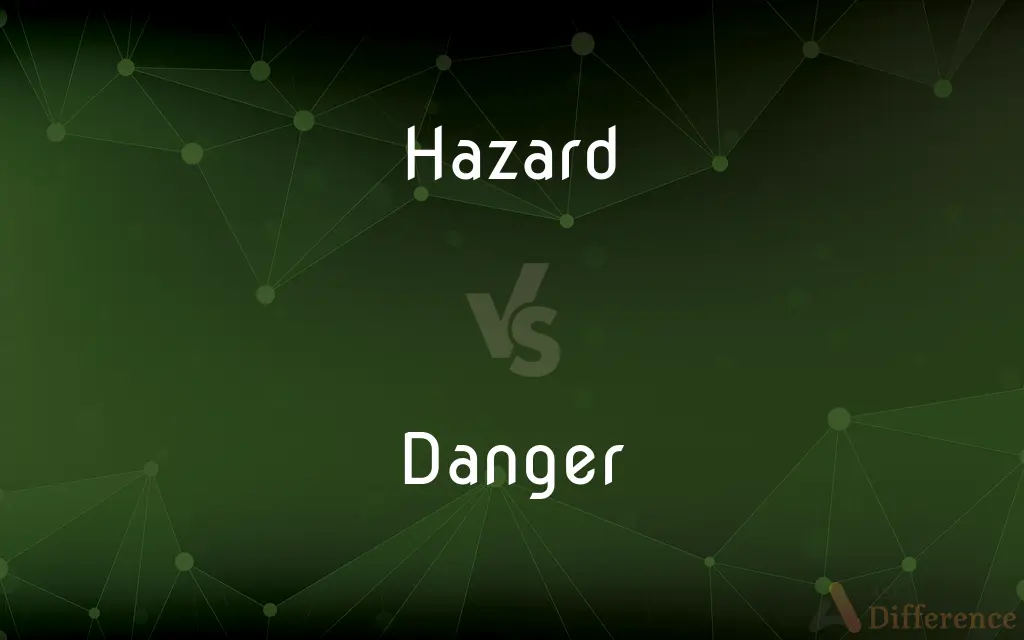Hazard vs. Danger — What's the Difference?
By Maham Liaqat & Fiza Rafique — Updated on April 17, 2024
Hazard refers to something that has the potential to cause harm, while danger indicates the presence of immediate risk or the likelihood of harm occurring.

Difference Between Hazard and Danger
Table of Contents
ADVERTISEMENT
Key Differences
A hazard is a source of potential damage, harm, or adverse health effects on something or someone. Whereas, danger is a state or condition where harm, injury, or adverse effects are imminent.
Hazards can exist without immediate consequences, such as a chemical stored safely but potentially harmful if mishandled. On the other hand, danger implies that the harm is likely to occur if the situation is not managed, like a chemical spill.
Identifying hazards is about recognizing potential threats that could cause harm under certain conditions, such as electricity or toxic substances. Conversely, recognizing danger involves assessing the likelihood and immediacy of the threat that these hazards pose.
In terms of response, a hazard often requires measures to mitigate potential risk, such as safety training or protective equipment. Danger, however, requires immediate action to prevent harm, like evacuations or emergency responses.
Risk assessments often distinguish between the potential of a hazard and the immediacy of danger, leading to different preventive or corrective actions depending on the assessment outcomes.
ADVERTISEMENT
Comparison Chart
Definition
A potential source of harm or adverse effect.
The likelihood or presence of harm or injury.
Presence of Risk
Potential, may not be immediate.
Immediate and likely.
Examples
Chemical substances, electricity, high places.
Chemical spill, live electrical wires, cliff edge.
Mitigation Measures
Safety training, preventive maintenance.
Emergency response, immediate corrective action.
Focus of Concern
Potential for causing damage.
Immediacy and likelihood of damage occurring.
Compare with Definitions
Hazard
In general, a potential obstacle or danger that is often marked for safety.
Hazard signs are posted near construction sites.
Danger
The condition of being likely to cause harm.
The broken railing posed a danger to passersby.
Hazard
Anything that can potentially cause harm.
A wet floor is a hazard because someone could slip and fall.
Danger
A situation where harm is imminent.
They were in danger when the building caught fire.
Hazard
A source of potential injury, harm, or negative health impact.
Smoking is a health hazard.
Danger
Used to describe the severity of potential consequences.
Extreme sports involve a high level of danger.
Hazard
In legal terms, something that can significantly increase the chance of harm when not obvious.
Unmarked steps could be considered a hazard in a lawsuit.
Danger
A warning of immediate risk.
The danger sign warns of high voltage.
Hazard
Environmental or occupational elements that could lead to harm if not controlled.
Asbestos is a well-known occupational hazard.
Danger
The likelihood of suffering harm or injury.
There is a high degree of danger when climbing without proper gear.
Hazard
A hazard is a potential source of harm. Substances, events, or circumstances can constitute hazards when their nature would allow them, even just theoretically, to cause damage to health, life, property, or any other interest of value.
Danger
The possibility of suffering harm or injury
His life was in danger
Hazard
A chance of being injured or harmed
Space travel is full of hazards.
Danger
Exposure or vulnerability to harm or risk.
Hazard
Risk or danger
A high degree of hazard.
Danger
A source or an instance of risk or peril.
Hazard
A possible source of danger
This room is a fire hazard.
Danger
(Obsolete) Power, especially power to harm.
Hazard
(Games) A game played with dice that is a forerunner of craps and was especially popular in England in the 1600s and 1700s.
Danger
Exposure to likely harm; peril.
There's plenty of danger in the desert.
Hazard
(Sports) An obstacle, such as a sand trap, found on a golf course.
Danger
An instance or cause of likely harm.
Hazard
(Archaic) Chance or an accident.
Danger
(obsolete) Mischief.
Hazard
To expose to danger or risk.
Danger
The stop indication of a signal (usually in the phrase "at danger").
The north signal was at danger because of the rockslide.
Hazard
To venture (something)
Hazard a guess.
Danger
(obsolete) Ability to harm; someone's dominion or power to harm or penalise. See in one's danger, below.
Hazard
To express at the risk of denial, criticism, or censure
"The wise young captain ... hazarded to the lieutenant-colonel that the enemy's infantry would probably soon attack the hill" (Stephen Crane).
Danger
(obsolete) Liability.
Hazard
The chance of suffering harm; danger, peril, risk of loss.
He encountered the enemy at the hazard of his reputation and life.
Danger
(obsolete) Difficulty; sparingness; hesitation.
Hazard
An obstacle or other feature which causes risk or danger; originally in sports, and now applied more generally.
The video game involves guiding a character on a skateboard past all kinds of hazards.
Danger
(obsolete) To claim liability.
Hazard
(in driving a vehicle) An obstacle or other feature that presents a risk or danger that justifies the driver in taking action to avoid it.
Danger
(obsolete) To imperil; to endanger.
Hazard
(golf) A sand or water obstacle on a golf course.
Danger
(obsolete) To run the risk.
Hazard
(billiards) The act of potting a ball, whether the object ball (winning hazard) or the player's ball (losing hazard).
Danger
Authority; jurisdiction; control.
In dangerhad he . . . the young girls.
Hazard
(historical) A game of chance played with dice, usually for monetary stakes; popular mainly from 14th c. to 19th c.
Danger
Power to harm; subjection or liability to penalty.
You stand within his danger, do you not?
Covetousness of gains hath brought [them] in dangerof this statute.
Hazard
Chance.
Danger
Exposure to injury, loss, pain, or other evil; peril; risk; insecurity.
Hazard
(obsolete) Anything that is hazarded or risked, such as a stake in gambling.
Danger
Difficulty; sparingness.
Hazard
(tennis) The side of the court into which the ball is served.
Danger
Coyness; disdainful behavior.
Those rich man in whose debt and danger they be not.
Hazard
(programming) A problem with the instruction pipeline in CPU microarchitectures when the next instruction cannot execute in the following clock cycle, potentially leading to incorrect results.
Danger
To endanger.
Hazard
To expose to chance; to take a risk.
Danger
The condition of being susceptible to harm or injury;
You are in no danger
There was widespread danger of disease
Hazard
To risk (something); to venture, incur, or bring on.
I'll hazard a guess.
Danger
A venture undertaken without regard to possible loss or injury;
He saw the rewards but not the risks of crime
There was a danger he would do the wrong thing
Hazard
A game of chance played with dice.
Danger
A cause of pain or injury or loss;
He feared the dangers of traveling by air
Hazard
The uncertain result of throwing a die; hence, a fortuitous event; chance; accident; casualty.
I will stand the hazard of the die.
Danger
A dangerous place;
He moved out of danger
Hazard
Risk; danger; peril; as, he encountered the enemy at the hazard of his reputation and life.
Men are led on from one stage of life to another in a condition of the utmost hazard.
Hazard
Holing a ball, whether the object ball (winning hazard) or the player's ball (losing hazard).
Hazard
Anything that is hazarded or risked, as the stakes in gaming.
Hazard
Any place into which the ball may not be safely played, such as bunkers, furze, water, sand, or other kind of bad ground.
Hazard
To expose to the operation of chance; to put in danger of loss or injury; to venture; to risk.
Men hazard nothing by a course of evangelical obedience.
He hazards his neck to the halter.
Hazard
To venture to incur, or bring on.
I hazarded the loss of whom I loved.
They hazard to cut their feet.
Hazard
To try the chance; to encounter risk or danger.
Hazard
A source of danger; a possibility of incurring loss or misfortune;
Drinking alcohol is a health hazard
Hazard
An unknown and unpredictable phenomenon that causes an event to result one way rather than another;
Bad luck caused his downfall
We ran into each other by pure chance
Hazard
An obstacle on a golf course
Hazard
Put forward, of a guess, in spite of possible refutation;
I am guessing that the price of real estate will rise again
I cannot pretend to say that you are wrong
Hazard
Put at risk;
I will stake my good reputation for this
Hazard
Take a risk in the hope of a favorable outcome;
When you buy these stocks you are gambling
Common Curiosities
What are common examples of hazards in the workplace?
Common examples include exposed wires, slippery floors, and hazardous chemicals.
What distinguishes a hazard from danger?
A hazard is a potential source of harm, while danger implies a high likelihood of harm occurring.
Can a hazard exist without immediate danger?
Yes, a hazard can exist without posing immediate danger, depending on how well it is managed or controlled.
How can one mitigate the risks associated with hazards and dangers?
Mitigation can include safety training, proper equipment, emergency plans, and regular maintenance checks.
How do signs help in communicating hazards and dangers?
Signs provide warnings and information to prevent harm by alerting people to potential hazards and dangers.
Are natural events considered hazards or dangers?
Natural events can be considered hazards, and when they pose immediate threats, they become dangers, such as a looming hurricane.
What role does risk assessment play in identifying hazards and dangers?
Risk assessment helps identify and evaluate potential hazards and the degree of danger they pose to take appropriate safety measures.
How does danger affect emergency response?
Danger requires immediate and often urgent responses to prevent harm or reduce risks.
What legal implications do hazards and dangers carry?
Failure to manage hazards and protect against dangers can lead to liability and legal consequences for negligence.
What is the importance of distinguishing between hazard and danger in safety protocols?
Distinguishing between them helps in applying the appropriate safety measures and prioritizing actions based on the immediacy and severity of the risk.
Share Your Discovery

Previous Comparison
Filtration vs. Purification
Next Comparison
Firenze vs. FlorenceAuthor Spotlight
Written by
Maham LiaqatCo-written by
Fiza RafiqueFiza Rafique is a skilled content writer at AskDifference.com, where she meticulously refines and enhances written pieces. Drawing from her vast editorial expertise, Fiza ensures clarity, accuracy, and precision in every article. Passionate about language, she continually seeks to elevate the quality of content for readers worldwide.














































